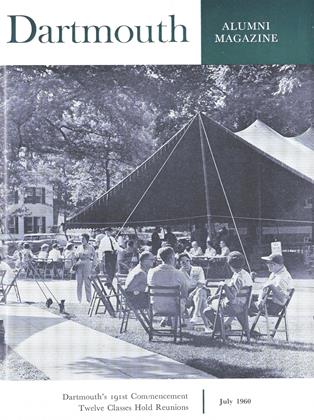For Restrictive Clauses
TO THE EDITOR:
I have read with considerable interest the article on "Fraternity Discrimination Faces a Deadline" and alumni comments on the subject. At the risk of injecting a sour note into the concert of approval of the College and Fraternity actions, I would like to present the views of one who does not, in any way, shape or form, approve of forcing fraternities at Dartmouth to eliminate restrictive clauses.
Life is selective and discriminatory from the time one is born. I believe that few of us would have it otherwise. Without discrimination, which implies the ability to differentiate, we would like or admire everything and everybody in exactly the same proportion. This means to me that we should all assume the mental proportions of a cabbage.
Discrimination or selection is particularly valuable when it applies to choosing the people with whom we associate, and each of us exercises it every single day of our lives. Why, then, not allow social groups such as fraternities the same privilege? I feel rather certain that the large number of fraternities at Dartmouth insures sufficient room to take care of anybody feeling he had been the object of discrimination by the four fraternities with restrictive clauses. No individual is forced to join a fraternity with restrictive clauses - if one does not approve of them, he should join some other group which has standards which more nearly match his own. If Dartmouth students in any overwhelming proportion sincerely disapprove of those fraternities with restrictive clauses, those same fraternities would wither and die very shortly, with no help from the Administration.
I frankly believe that the College Administration went far beyond where it should, in promoting and pushing this situation to a point where the chapters of four national fraternities will have to demit from their national association, in order to retain College recognition. In my admittedly conservative opinion, this action is pretty close to my definition of "crackpot liberalism." Donald T. Oakes '44, in his letter in the May issue of the ALUMNI MAGAZINE, defines the issue rather better than I could. If I may use his words, except in a thoroughly approving context, I certainly do think that "If such a grouping is unanimous in choosing for itself to limit fraternity membership by racial or religious standards, this is all right merely because this decision was not imposed by an outside authority." How could any organization, whether business, social or educational, properly select its members without admittance standards, includable in which are - so far as social organizations are concerned - race and religious standards. Religious organizations have religious standards and ethnic organizations have racial standards - why not be realistic and admit that without the ability to discriminate (and not necessarily unfairly) our life would be quite a hodge-podge. As long as a basic tenet of any free society is the right to choose one's own associates, whether on a personal or an organizational level, discrimination is involved by definition. Perhaps just as importantly, the right to reject people for one's own private reasons, whatever they may be, is obviously the obverse of this, in any social situation, regardless of how undesirable this may appear in business or educational groupings.
St. Paul, Minn.
EDITOR'S NOTE: It does not seem to us that the principle of selectivity is damaged by the new fraternity requirements, The heart of the matter is that the fraternity brothers are now free to set their own standards of selectivity (restriction, if you will) without dictation from beyond the campus.
 View Full Issue
View Full Issue
More From This Issue
-
 Feature
FeatureThe Disinterested Citizen and the Maintenance of Freedom
July 1960 By WHITNEY NORTH SEYMOUR, LL.D. '60 -
 Feature
FeatureThe Fifty-Year Address
July 1960 By ANDREW J. SCARLETT '10 -
 Feature
FeatureHONORARY DEGREE CITATIONS
July 1960 -
 Feature
Feature1960 Commencement
July 1960 By D.E.O. -
 Feature
FeatureThe Image of the Educated Man
July 1960 By HARRISON CASE DUNNING '60 -
 Feature
FeatureThe Reunion Week
July 1960







